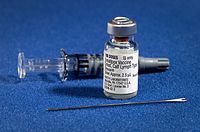
Photo from wikipedia
Objective(s): New generation of allergy vaccines is capable of promoting the development of protective IgG and blocking the functionality of allergen-specific IgE. We incorporated universal and powerful T-cell epitopes from… Click to show full abstract
Objective(s): New generation of allergy vaccines is capable of promoting the development of protective IgG and blocking the functionality of allergen-specific IgE. We incorporated universal and powerful T-cell epitopes from tetanus and diphtheria toxoids (TD epitope) into recombinant Che a 2, the well-known allergic profilin of Chenopodium album, to determine its immunological properties. Materials and Methods: The sequence and accordingly the structure of the recombinant Che a 2 was altered to generate a hypoallergenic variant (rChe a 2.rs). Moreover, TD epitope was incorporated to produce a novel vaccine that was nominated as rChe a 2.rsT.D. The effect of treatment with these variants was evaluated on the generation of allergen-specific IgG class, as well as lymphocyte proliferation in mice. Moreover, IgE-binding characteristics of the allergic patients’ sera were determined by ELISA and proliferation and cytokine production was measured in T-cells. Results: ELISA and dot blot revealed strong reduction of the IgE-reactivity of human sera to the variants of Che a 2 as compared to the wild-type molecule. Furthermore, Che a 2.rs and Che a 2.rsT.D induced much lower levels of IL5 and IL13 secretion from allergic patients’ PBMCs in comparison to wild-type Che a 2 protein. In mice, rChe a 2.rsT.D induced high titers of Che a 2-specific IgG antibody capable of blocking IgE-binding to rChe a 2 and induced lymphocyte proliferation more potently than rChe a 2.rs. Conclusion: Collectively, incorporation of T-cell epitopes of tetanus and diphtheria into hypoallergenic vaccines can dramatically enhance anti-allergic immune mechanisms, particularly in poor responders.
Journal Title: Iranian Journal of Basic Medical Sciences
Year Published: 2020
Link to full text (if available)
Share on Social Media: Sign Up to like & get
recommendations!